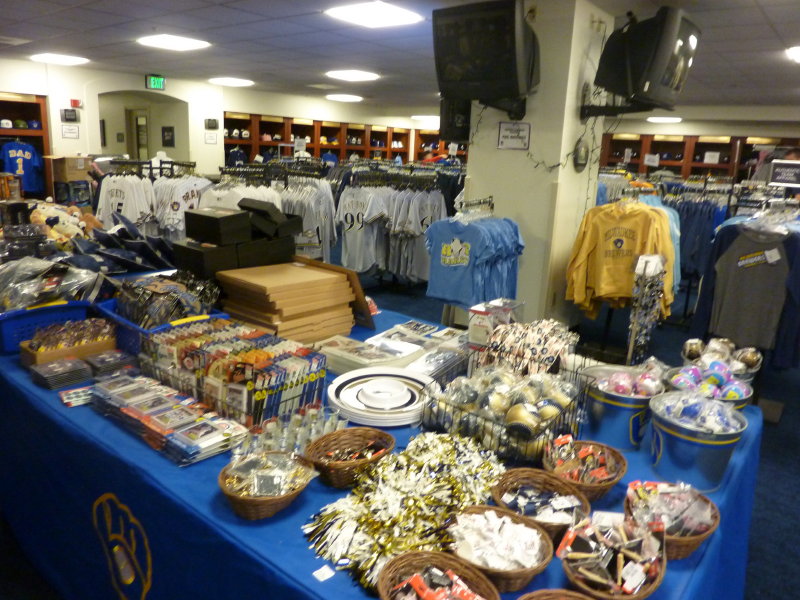This was supposed to have been figured out a long time ago.
The last day of baseball's regular season for Brewers fans usually means little more than the passing of another day as other teams gear up for the postseason. This year the final day of the season was supposed to be treated as little more than a glorified spring training game, just trying to keep everyone both fresh and sharp simultaneously for the playoffs.
However, as it stands today, there are no fewer than four different playoff scenarios that the Brewers could face in the NLDS:
- Home field advantage vs. Atlanta
- Home field advantage vs. Arizona
- Vs. Arizona with the Diamondbacks having home field advantage
- Vs. Philadelphia with the Phillies having home field advantage
The last day of the season for Brewers fans usually doesn't involve scoreboard watching. However, as I sat in the stands at Miller Park last night, I became continually frustrated at the scoreboard policy of showing all of the baseball scores on a rotating basis. Why was I to be subjected to waiting for the Cardinals-Astros score or the Braves-Phillies score for the sake of telling me the Mariners were trailing the A's or the Twins were beating the Royals. Who cares?
One year ago, as the Brewers played out a frustrating two-year stretch under Ken Macha's leadership, no one at Miller Park would have noticed. But the last couple of days have been, improbably, the most intense scoreboard watching days of the year.
One month ago, this was all supposed to be figured out – especially in the National League. The Brewers would host the Braves; the Phillies would host the Diamondbacks. Today, the only thing that is certain is that the Phillies have home field advantage throughout the playoffs.
As for tonight's games:
- If the Brewers beat the Pirates or the Dodgers beat the Diamondbacks, Milwaukee would have home field advantage in the NLDS as the No. 2 seed.
- If the Brewers lose to the Pirates and the Diamondbacks beat the Dodgers, Arizona would have home field advantage as the No. 2 seed. Arizona and Milwaukee would then have identical records; however, the Diamondbacks beat the Brewers 4-games-to-3 in head-to-head play this year, giving them the tiebreaker.
- If the Braves beat the Phillies and the Astros beat the Cardinals, Atlanta is the National League Wild Card winner. That scenario seems unlikely considering how poorly the Braves have played in September and how hot the Cardinals have been.
- If St. Louis wins and Atlanta loses, the Cardinals are the Wild Card winner. If they both win or they both lose, they would have a one-game playoff Thursday night in St. Louis.
Got all that? Good, because here is where you might need to print this column out and follow along with the games of this evening:
Scenario #1: If Milwaukee, Atlanta, Arizona, and St. Louis win, then:
- The Brewers would host either the Diamondbacks or Braves, depending on who wins the one-game Atlanta / St. Louis one-game playoff.
- If the Braves win, the Brewers host them on Saturday and the Phillies would host the Diamondbacks.
- If the Cardinals win, the Brewers host the Diamondbacks on Saturday, and St. Louis would travel to Philadelphia.
If Milwaukee wins but Atlanta, Arizona, and St. Louis lose, then you would have the exact same scenario as above.
Scenario #2: If Atlanta wins but Milwaukee, Arizona, and St. Louis lose, then:
- The Brewers would host the Braves on Saturday
- The Phillies would host the Diamondbacks on Saturday
This would also be the case if Atlanta and Milwaukee win and St. Louis and Arizona lose.
Scenario #3: If Arizona wins, and Milwaukee, St. Louis and Atlanta lose, then:
- The Brewers travel to either Arizona or Philadelphia.
- If the Braves win the one-game playoff at St. Louis, the Brewers will travel to Philadelphia as the No. 3 seed, and the Diamondbacks will host the Braves as the No. 2 seed.
- If the Cardinals win the one-game playoff at St. Louis, the Brewers would travel to Arizona as the No. 3 seed to play the #2 seeded Diamondbacks.
Obviously, this would also be the case if the Brewers lose, while the Diamondbacks, Cardinals, and Braves all win this evening.
Scenario #4: If St. Louis wins and Milwaukee, Atlanta, and Arizona lose, then:
- The Brewers host the Diamondbacks on Saturday
- St. Louis would travel to Philadelphia on Saturday
This is also the case if the Brewers, Diamondbacks, and Cardinals all win tonight.
Scenario #5: If the Cardinals and Diamondbacks win and the Braves and Brewers lose, then:
- Milwaukee travels to Philadelphia
- St. Louis travels to Arizona
And that's just in the National League.
Rarely before has so much been up in the air on the final day of the season. The only thing for sure is that Philadelphia will host someone and that Milwaukee and Arizona will be playing someone, somewhere.
But isn't this the intelligent design of baseball's regular season?
Prior to the 1995 season and the advent of the added tier of the Wild Card round, almost every seeding was already set up days in advance. Home field advantage was done by alternating years, not by better record (either overall or head-to-head in the case of a tiebreaker).
Certainly there were years where a race or two came down to the regular season's final game, such as in 1982 when the winner of the Brewers vs. Orioles game would be the winner of the American League East. It was predetermined that the California Angels (who won the American League West by three games over the Kansas City Royals) would open up the ALCS on Oct. 5 in Anaheim.
There was no home field advantage to play for back in 1982. The division was the only thing on the line on that Sunday afternoon in Baltimore. In a lot of ways baseball was simplified by this. Teams knew exactly where they were going to be without endless scenarios. Fans could make their travel plans if they wanted to follow their teams. Sports editors could make their coverage plans without having to fill up the circular file.
But what fun is that?
This time of the year hasn't been filled with much intrigue in seasons past. One month ago it looked as though it were a done deal. Today it is anything but that.
Happy scoreboard watching!
Doug Russell has been covering Milwaukee and Wisconsin sports for over 20 years on radio, television, magazines, and now at OnMilwaukee.com.
Over the course of his career, the Edward R. Murrow Award winner and Emmy nominee has covered the Packers in Super Bowls XXXI, XXXII and XLV, traveled to Pasadena with the Badgers for Rose Bowls, been to the Final Four with Marquette, and saw first-hand the entire Brewers playoff runs in 2008 and 2011. Doug has also covered The Masters, several PGA Championships, MLB All-Star Games, and Kentucky Derbys; the Davis Cup, the U.S. Open, and the Sugar Bowl, along with NCAA football and basketball conference championships, and for that matter just about anything else that involves a field (or court, or rink) of play.
Doug was a sports reporter and host at WTMJ-AM radio from 1996-2000, before taking his radio skills to national syndication at Sporting News Radio from 2000-2007. From 2007-2011, he hosted his own morning radio sports show back here in Milwaukee, before returning to the national scene at Yahoo! Sports Radio last July. Doug's written work has also been featured in The Sporting News, Milwaukee Magazine, Inside Wisconsin Sports, and Brewers GameDay.
Doug and his wife, Erika, split their time between their residences in Pewaukee and Houston, TX.







